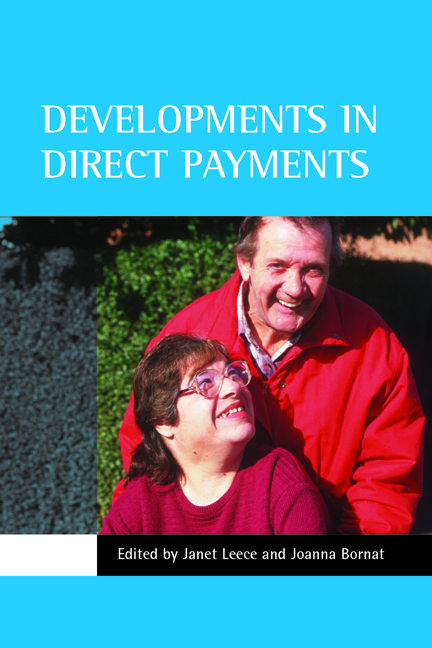Book contents
fourteen - “It’s not like being at work”: a study to investigate stress and job satisfaction in employees of direct payments users
Published online by Cambridge University Press: 18 January 2022
Summary
The numbers of people using cash payments to purchase social support are likely to swell dramatically in the near future due to government commitment to increasing the take-up of direct payments. However, the relationship between direct payments users and the workers they employ to provide their support is poorly understood, as research into direct payments has largely focused on the experiences of disabled people. Employees of direct payments users have been generally ignored and the few studies to report findings from a worker's perspective have tended to predict a problematic relationship.
This chapter looks at previous research into personal assistants’ experiences of working for direct payments users and reports findings from an in-depth PhD study that examines this relationship. This study is unique in that it considers job satisfaction and stress in personal assistants and compares their experiences with those of a comparable group of employees: local authority home care workers. This comparison has been missing from the literature and is of consequence, as the direct payments relationship should not be seen in isolation. For many disabled people, the alternative to direct payments is the receipt of home care, and for many personal assistants a likely alternative employment is home care work.
Background
Local authorities in England have been able to give cash payments to individuals to purchase their own support since 1997, following the implementation of the 1996 Community Care (Direct Payments) Act. Direct payments have had a low take-up nationally, although this is likely to change radically as the government has demonstrated a clear commitment to increasing numbers of people using direct payments.
On 8 April 2003 it became a mandatory responsibility rather than an option for local authorities to offer cash payments, with the direct payments guidance stating: “the government expects to see a substantial increase in the numbers of direct payment recipients and will be monitoring local councils’ progress in achieving this goal” (DH, 2003, p 5). In line with this, direct payments became a performance indicator in 2004 to encourage local authorities to extend their schemes. The government has also pledged money to promote the take-up of cash payments by those groups currently under-represented by creating the Direct Payments Development Fund.
- Type
- Chapter
- Information
- Developments in Direct Payments , pp. 189 - 204Publisher: Bristol University PressPrint publication year: 2006

